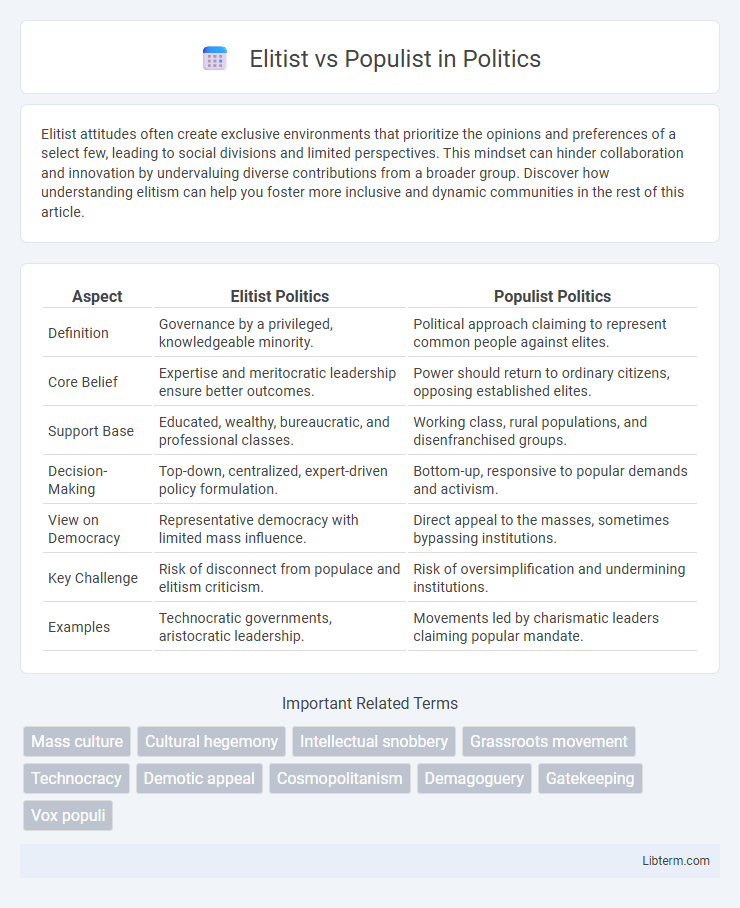Elitist attitudes often create exclusive environments that prioritize the opinions and preferences of a select few, leading to social divisions and limited perspectives. This mindset can hinder collaboration and innovation by undervaluing diverse contributions from a broader group. Discover how understanding elitism can help you foster more inclusive and dynamic communities in the rest of this article.
Table of Comparison
| Aspect | Elitist Politics | Populist Politics |
|---|---|---|
| Definition | Governance by a privileged, knowledgeable minority. | Political approach claiming to represent common people against elites. |
| Core Belief | Expertise and meritocratic leadership ensure better outcomes. | Power should return to ordinary citizens, opposing established elites. |
| Support Base | Educated, wealthy, bureaucratic, and professional classes. | Working class, rural populations, and disenfranchised groups. |
| Decision-Making | Top-down, centralized, expert-driven policy formulation. | Bottom-up, responsive to popular demands and activism. |
| View on Democracy | Representative democracy with limited mass influence. | Direct appeal to the masses, sometimes bypassing institutions. |
| Key Challenge | Risk of disconnect from populace and elitism criticism. | Risk of oversimplification and undermining institutions. |
| Examples | Technocratic governments, aristocratic leadership. | Movements led by charismatic leaders claiming popular mandate. |
Understanding Elitism: Definition and Origins
Elitism refers to the belief that a society or system should be led by a select group of individuals considered superior in terms of intelligence, wealth, or social status. Originating from ancient social hierarchies and political theories, elitism emphasizes governance by a knowledgeable elite rather than the general populace. This concept influences modern debates on leadership, power distribution, and democratic participation.
Defining Populism: Key Principles and History
Populism centers on the belief that society is divided between the virtuous common people and a corrupt elite, advocating for policies that prioritize ordinary citizens' interests. Originating in the late 19th century with movements like the American Populist Party, populism emphasizes direct political participation, skepticism of established institutions, and appeals to popular sovereignty. Key principles include anti-elitism, mobilization of mass support, and the promotion of policies addressing economic and social inequalities.
Core Differences between Elitism and Populism
Elitism emphasizes governance by a select group of individuals presumed to possess superior knowledge, education, or social status, advocating for policies that support hierarchical structures and expertise-driven decision-making. Populism, in contrast, champions the voice and power of the ordinary people against perceived elites, promoting policies that appeal to popular sentiments and often challenging established institutions. The core difference lies in elitism's trust in specialized authority versus populism's emphasis on mass participation and anti-elitist rhetoric.
Societal Impact: Elitist vs Populist Approaches
Elitist approaches often concentrate decision-making power within a select group of experts, potentially leading to efficient policy implementation but risking social exclusion and diminished public trust. Populist strategies emphasize mass participation and appeal to the general populace, which can enhance democratic engagement but also foster polarization and undermine institutional stability. The societal impact of these approaches hinges on balancing expert guidance with inclusive representation to promote cohesive and effective governance.
Political Representation: Who Speaks for Whom?
Elitist political representation centers on decision-making by a select group of individuals deemed knowledgeable or capable, often prioritizing expertise and long-term policy goals over broad public preferences. Populist representation emphasizes direct appeal and responsiveness to the general populace, advocating for the concerns and values of ordinary citizens against perceived elite interests. This fundamental divergence shapes governance structures, with elitists favoring technocratic leadership and populists promoting mass participation and accountability.
Elitism in Modern Governance
Elitism in modern governance emphasizes decision-making by a select group of individuals perceived as having superior knowledge, experience, or expertise, often shaping policies with long-term strategic goals in mind. This approach prioritizes efficiency, stability, and informed leadership, which proponents argue mitigates the risks of populism's emotional or short-sighted appeals. Critics contend elitism may lead to disconnect from broader public interests, but supporters assert it ensures competent administration in complex political environments.
Populism in Contemporary Politics
Populism in contemporary politics centers on appealing directly to the general populace by advocating for the interests and concerns of ordinary people against perceived elite dominance. This political approach often emphasizes nationalism, anti-establishment rhetoric, and calls for greater public participation in governance. Populist movements have surged globally, influencing policy debates and shaping electoral outcomes by challenging traditional political institutions and elites.
Advantages and Drawbacks of Elitism
Elitism emphasizes decision-making by a select group of highly skilled or knowledgeable individuals, ensuring policies are informed by expertise and promoting efficient governance. However, this approach risks alienating the general populace, fostering social inequality, and overlooking diverse perspectives and grassroots concerns. The concentration of power in an elite group can also lead to potential abuses and reduced democratic participation.
Strengths and Weaknesses of Populism
Populism's strength lies in its ability to mobilize large groups by appealing to common interests and addressing widespread dissatisfaction with elites, fostering political engagement and giving voice to underrepresented communities. However, its weaknesses include a tendency to oversimplify complex issues, which can lead to polarized societies and the erosion of institutional checks and balances. Populist movements often struggle with sustaining long-term governance due to a reliance on charismatic leadership and the risk of undermining democratic norms.
Finding Balance: Bridging Elitist and Populist Perspectives
Finding balance between elitist and populist perspectives requires recognizing the value of expert knowledge while ensuring broad public participation in decision-making. Integrating technocratic insights with grassroots concerns promotes policies that are both informed and responsive to the needs of the wider population. Effective governance emerges from harmonizing specialized expertise and popular sovereignty to foster inclusive, equitable outcomes.
Elitist Infographic

 libterm.com
libterm.com